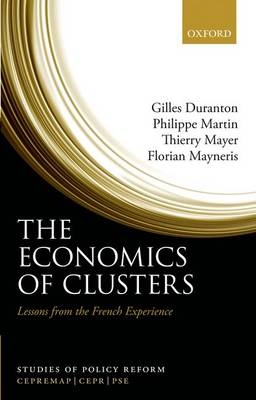
The Economics of Clusters
Oxford University Press (Verlag)
978-0-19-959220-3 (ISBN)
The development of clusters of economic activity is an important feature of industrial policy. Industry clusters have long fascinated economists and geographers alike, the most renowned being Silicon Valley which is seen by many as the blueprint for regional development, innovation, and growth. Several clusters have also developed across Europe, including SiliconFen in Cambridge and Minalogic in Grenoble, and in recent years cluster policies have become popular among policy makers as a useful tool for informing decisions on industrial, regional, and public policy. This book looks at the mechanisms at work behind cluster dynamics, the gains that can be expected from increased clustering, and the determinants of cluster policies. Focusing on France, it provides a theoretical and empirical study of clusters, their success and failures, and the policy lessons that can be applied to the wider international community. France is particularly interesting because there is a long tradition of strong government intervention regarding the location of economic activity, and cluster initiatives are relatively unified across the country. This book shows that, whilst gains from clusters do exist, some firms tend to cluster too much and that spatial agglomeration is only successful to a point, after which congestion effects can offset these gains. It questions the need and the feasibility of cluster policies aimed at interfering directly in the concentration process of firms, and thus looks beyond the general enthusiasm for clusters.
Gilles Duranton is professor of economics and holds the Noranda chair in economics at the University of Toronto. A graduate from HEC Paris and Sorbonne University, he obtained his PhD in economics jointly from the LSE and the Ecole des Hautes Etudes en Science Sociales, Paris. His research focuses on regional and urban issues. His empirical work is concerned with the estimation of the costs and benefits of cities and clusters. He is also interested in the evaluation of local policies and the effects of transportation infrastructure on urban development. He serves as co-editor for the Journal of Urban Economics and sits on the editorial board of several academic journals. He is a fellow of the Centre for Economic Policy Research and has worked as consultant on regional and urban policy for national governments and international organisations Philippe Martin is professor of economics at Sciences Po and a research fellow at the Centre for Economic Policy Research (CEPR, London). His previous positions were at the University of Paris I Panthéon-Sorbonne (Paris School of Economics), the Graduate Institute of International Studies in Geneva, and the Federal Reserve Bank of New York. His fields of research are international macroeconomics, international trade, the economics of military conflicts, and economic geography. He is a co-managing editor of Economic Policy and a member of Institut Universitaire de France. He was an academic adviser for the 2009 World Development Report on Economic Geography (World Bank). Thierry Mayer is professor of economics at Sciences-Po, Paris. He also is a scientific advisor in CEPII, and a research fellow in the International Trade / Regional Economics programme at CEPR. His research is primarily focused on economic geography, trade theory and empirics, and foreign direct investment determinants. His recent publications include research on the impact of globalization on armed conflicts, as well as papers looking at the diffusion of cultural patterns across space. He has published theoretical and empirical analysis of locations choices by multinational firms, studying in particular the extent and determinants of agglomeration patterns. His most frequently cited research includes empirical studies on the level and causes of market fragmentation in the European Union. His research was rewarded by a number of distinctions in France, including the bronze medal of the CNRS. Florian Mayneris is a postdoctoral researcher at CORE (Université Catholique de Louvain). After graduate studies at the Ecole Normale Supérieure, Sciences-Po and Sorbonne University, he completed his PhD in 2009 at the Ecole des Hautes Etudes en Sciences Sociales in Paris. He has also worked as a consultant for the French administration in charge of regional policy. His research focuses on the impact of agglomeration and trade on firm-level performance and on the evaluation of clusters policies.
1. Introduction ; 2. The Economic Rationale of Clusters and Cluster Policies ; 3. The Evolution of French Economic Geography ; 4. Measuring Economic Gains from Clusters ; 5. Public Support for Clusters: A Case Study on <"French Local Productive Systems"
| Reihe/Serie | Studies of Policy Reform |
|---|---|
| Zusatzinfo | 24 Figures, 9 Tables |
| Verlagsort | Oxford |
| Sprache | englisch |
| Maße | 152 x 224 mm |
| Gewicht | 370 g |
| Themenwelt | Naturwissenschaften ► Geowissenschaften ► Geografie / Kartografie |
| Wirtschaft ► Betriebswirtschaft / Management ► Unternehmensführung / Management | |
| Wirtschaft ► Volkswirtschaftslehre ► Mikroökonomie | |
| ISBN-10 | 0-19-959220-9 / 0199592209 |
| ISBN-13 | 978-0-19-959220-3 / 9780199592203 |
| Zustand | Neuware |
| Haben Sie eine Frage zum Produkt? |
aus dem Bereich


